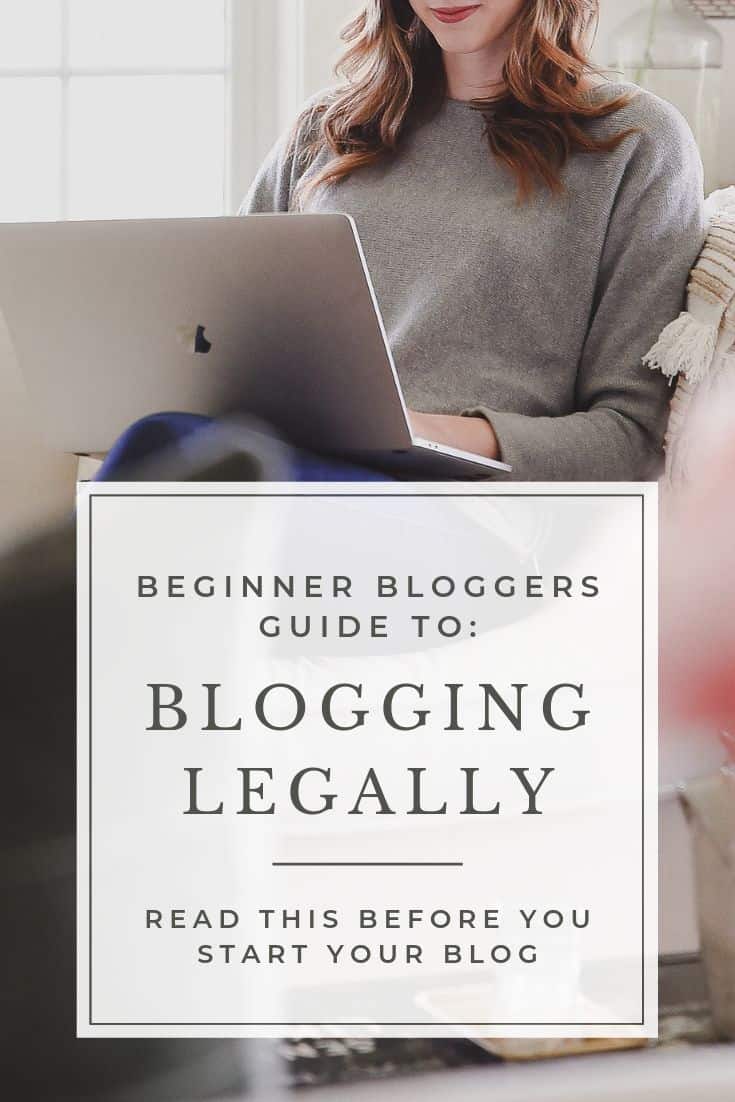Before diving into the world of blogging, you need to have a few things on your website in order to be “legal”. Here’s what you need to know!

After years of blogging, and learning from so many generous people in this industry, I think it’s due time I begin paying it forward by sharing some of the knowledge I’ve acquired.
In this new business series, I will cover blogging for beginners, growing your blog, making money from your blog, and anything else blogging or business related that I can think of!
When you first begin your blog or small business, it can feel a little daunting! Questions like: do I need to pay taxes?, do I need an LLC?, or how do I form an LLC? run through your mind and can prevent you from taking the leap.
Today, I want to share with you an important aspect of starting a blog: making your website legal. Often times blogging is the foundation of a small business, so I figured this would be a great place to start!
I reached out to my friend Paige from The Creative Law Shop to help me answer some of these questions. Paige, formerly a litigations lawyer, began her small business a few years ago, and it is an invaluable resource for creatives!
The Creative Law Shop is where I source all of my legally binding contracts for my business: Terms & Conditions, Privacy Policies, contracts, etc… I love Paige, and I am so grateful for the invaluable asset she’s created for bloggers and small business owners.
Since these contracts are not free, or cheap (I believe you get what you pay for here), I am really excited to be able to pass on a discount to you!
What that said, let’s talk about what you need to have in order when you begin your blog.

What do you need on your website to make it legal?
After you’ve picked your name, you’ve set up your domain, you’ve made your site live…you need a few things in order to make sure your website is “legal”:
- Privacy Policy (find one here)
- Disclosure
- Terms & Conditions (find here)
Paige was gracious enough to answer some questions about the importance of these elements on a website, and I think you will find that her explanations are easy to understand. I hope after reading this, you feel empowered and ready to blog!
Do I need a terms and conditions page on my website?
A Terms & Conditions satisfies an entirely different purpose than a Privacy Policy does- while a Privacy Policy is a federal and GDPR requirement, a Terms & Conditions isn’t an actual legal requirement. However, it is something I require all of my clients to have.
A Terms & Conditions is the contract that governs your website, which means that anyone perusing your website automatically agrees to your terms, that you have set.
Why is it important that people agree to your terms? Well, your terms can mandate things such as that no one can take any content (such as copy, or photos) from your site without your consent, for starters.
The overall point being, as a blogger, you must be in control of every part of your website- and mandating the terms of use of your site is the first step.
Terms of Conditions act differently in different scenarios- for example, if you just have a website, you just need a Terms & Conditions (users automatically agree to the terms by using your site); if you have an online shop, you must have a Terms & Conditions of Online Sale (and customers must click something such as “I agree to the terms of sale” to be applicable); a Terms & Conditions for Online Courses if you have an online course, and so on and so forth.
Do I still need Terms & Conditions even if you aren’t selling anything?
That’s correct – everyone with a website should have a Terms & Conditions, no matter what.

Why might a blogger need to have a disclosure?
One of the often-overlooked liabilities of blogging is the need for disclosures. If you’re giving any sort of advice in a blog post that involves an industry requiring a license (such as the medical, legal, financial, etc type industries), you must have a disclosure stating that the reader shouldn’t rely on your advice.
If the blog itself often has posts on this subject, you should have the disclosure in your Terms & Conditions, but it would also be wise to include that disclosure in the post itself.
Note from Chloe: Disclosure also needs to be made any time payment or free product is exchanged for promotion of a product. This applies to: social media, blog posts, amazon shop pages, etc… Even if you do not receive payment for the post, but you did receive free product, a nice dinner, a free stay, etc…the endorsement should be disclosed.
For example, “swipe up links” on instagram should be disclosed as #affiliate links. Any social media post made in exchange for money or promotion of a product needs to include a discourse. This disclosure can be something as simple as #partner or #affiliate, but it needs to appear as the first hashtag in the post.
In a blog post, it should be at the top of the page, so that the viewer understands the nature of your advice or endorsement before they read the blog post. Scroll up to the top of my page and check mine out if you’d like! You’ll notice some bloggers have this at the very bottom of their website or on a different page entirely, this is technically unacceptable to the FTC.
It’s best practice to place a clear disclosure above the fold, on the same screen as the claim/product/endorsement. Remember, it’s all about being transparent, so as long as the average reader or viewer clearly understands the relationship, you’re good.
Are free online legal templates reliable?
Maybe…but you really have no idea if it contains the language needed to actually protect you.
For example, most people don’t know, but if a paragraph in a contract (here, your Terms & Conditions) is invalid according to the laws of your state, then the entire agreement becomes invalid, unless you’ve included specific sever-ability language.
When it comes to your business, it never pays to gamble with anything free on the internet (it’s probably free for a reason); especially when it comes to the legality of your business.
What are the most important pieces of the T&C’s for bloggers?
Great question! Like I mentioned before, disclosures, if your business requires them; as well as all the terms that turn your Terms and Conditions into a legal document.
Aside from that, bloggers are typically in the industry of creating beautiful imagery and copy, and you must set yourself up to have recourses available if that content is stolen or copied from you.
A Terms and Conditions can provide you with a breach of contract cause of action if or when you need to protect your work, which may sound a bit complicated now, but will be exactly what you want to have in those types of unfortunate situations. Be proactive by setting the foundation now, so that you are prepared when it matters, rather than retroactively trying to play catch up when it’s too late.
Starting a Creative Business Legally
6 Things you Need to Know to Keep your Blog Legal




I stumbled on this platform while browsing social media comments about apps for Kenyan players. Curiosity got me to click https://1win.or.ke/app/. Playing from Kenya, I appreciated that the interface was simple and responsive. I lost a few times at first and thought it might be another frustrating evening. Then a later round brought my balance back and left me ahead. I stopped immediately and withdrew later. Ending the session calmly without chasing losses was surprisingly rewarding.
krikya — the official online casino and betting platform for players from Bangladesh. Here you can bet on cricket, soccer, kabaddi, and eSports, as well as play slots and live casino games. Fast deposits via bKash and Nagad, Bangla support, and generous bonuses make the gaming experience convenient.
Getting the legal foundations right is what allows you to operate with confidence and build real trust with your audience. That layer of trust is everything.Your point about clear disclosures for advertising and affiliates is key. It actually makes me think about the execution side of those partnerships. When you’re promoting a product or service within your content, the accompanying digital assets need to carry that same professionalism and transparency. This is where choosing the right format matters. A well-integrated rich media banner, for example, can be a fantastic tool—it can showcase a product feature, include a clear “sponsored” label, and even house the required disclosures within an expandable unit, all while engaging a reader visually. It turns a legal requirement into a seamless part of the user experience.
From my personal experience working with US-focused platforms, https://floppydata.com/ delivered stable residential and mobile proxy performance. The IP pool appeared diverse across various US regions, which reduced repetitive blocks and detection risks. Speeds were steady even during heavier workloads, and session management was flexible enough for daily operations. When operating within the United States, having reliable IP quality makes a noticeable difference in maintaining uninterrupted workflows.